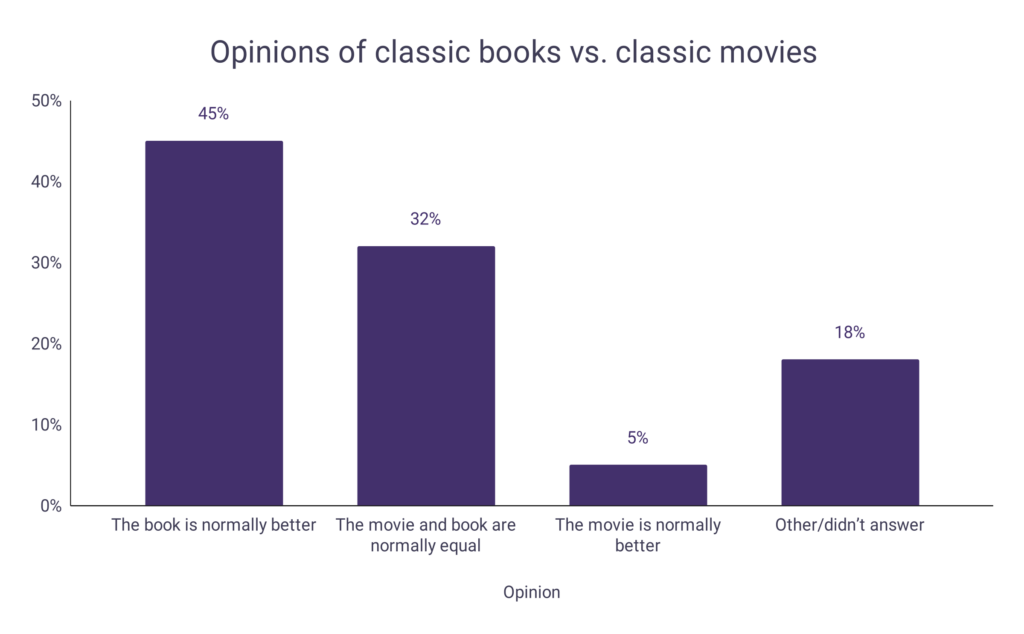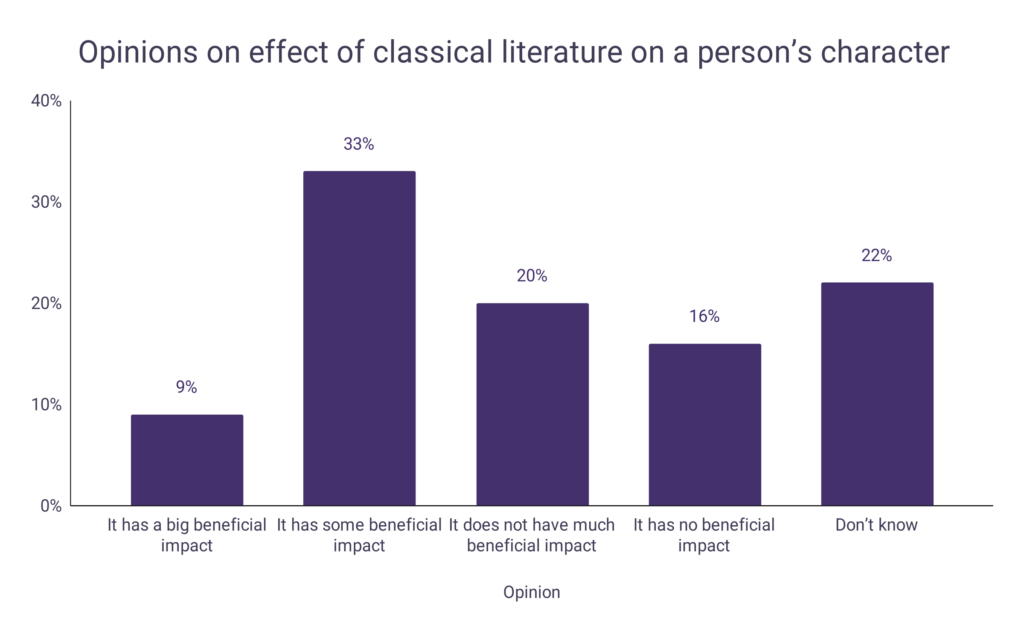People who immerse themselves in classic books can find more than just the regular benefits associated with reading, through the enjoyment of the most recognized stories. Classic literature written by renowned authors can also provide readers with timeless, enriching and fulfilling experiences that enhance critical thinking and boost knowledge.
- A survey of students showed that 70% believed reading classic books is a beneficial activity.
- Furthermore, 80% believed that classic titles are still relevant in the modern world.
- In a survey of the British public, 62% admitted to having lied about reading classic novels before.
- The results showed it was the most common strategy used by people in order to make themselves seem smarter to others.
- Character-driven high literature novels (often classic literature) have been found to boost subjects’ empathy, social perception and emotional intelligence, when compared to reading other forms of fiction or nonfiction.
- Titles such as these push readers to be more imaginative and make many inferences, testing mental capacities that help the reader to grow.
- Classic literature is known to contain important moral messages, which encourage readers to start thinking about ethics in a critical way.
- It is also known to be more challenging to read and can be a brilliant way for readers to improve their overall vocabulary.
- Depression, anxiety, chronic pain and dementia sufferers can all benefit from reading classic literature to alleviate suffering.
- Jane Austen’s novels have been shown to provide the reader with a complex and rigorous brain workout as strong as solving mathematics problems or studying.
Opinions of classic books vs. classic movies
A US survey was performed to find opinions from consumers on whether classic books or their movie adaptations were better. Although classic literature featured prominently in the survey, other modern classic titles were also included.
- 77% of respondents believed that the original book is at least equal in quality to its movie adaptation.
- 45% of respondents believed that the original book is normally better than its movie adaptation.
- 32% of respondents believed that the original book is normally equal in quality to its movie adaptation.
- 5% of respondents believed that movie adaptations are normally better than the original book.
- Additionally, 9% of people in the survey reported watching movie adaptations without ever reading the original classic book.
| Opinion | Percentage of respondents |
| The book is normally better | 45% |
| The movie and book are normally equal | 32% |
| The movie is normally better | 5% |
| Other/didn’t answer | 18% |
A graph is given below to show the opinions of classic books vs. classic movies:

Opinions on effect of classical literature on a person’s character
As of 2021, people in Great Britain were asked for their opinions on the effect of classical literature on a person’s character.
- 62% of people surveyed believed that classical literature has at least some beneficial impact on a person’s character.
- 9% of people surveyed believed that classical literature has a big beneficial impact on a person’s character.
- 33% of people surveyed believed that classical literature has some beneficial impact on a person’s character.
- 20% of people surveyed believed that classical literature does not have much beneficial impact on a person’s character.
- 16% of people surveyed believed that classical literature has no beneficial impact on a person’s character.
| Opinion | Percentage of respondents |
| It has a big beneficial impact | 9% |
| It has some beneficial impact | 33% |
| It does not have much beneficial impact | 20% |
| It has no beneficial impact | 16% |
| Don’t know | 22% |
A graph is given below to show opinions on the effect of classical literature on a person’s character:

Additional benefits of classic literature
- Classic literature can open readers up to different ideas, perspectives and cultures, allowing for a better understanding of the world at large.
- Readers can learn new vocabulary and improve their comprehension and grammar through classic literature, as it frequently uses language that is more complex than in other works.
- It is generally considered to be more challenging and rewarding, providing a more memorable experience that can help improve critical thinking skills and even help with language acquisition.
- The complex structures and sentences expressed through classic literature can engage more areas of the reader’s brain when compared to reading simpler prose.
- This can even provide students with a great way to provide for standardized tests.
- Many books within classic literature contain strong viewpoints which are great for challenging the strength and validity of opposing ideas.
- Many other types of books contain references to the classics (literary allusions) which can only be understood by having read the title that is being referred to.
- Understanding these references between classics and other books can give a sense of satisfaction to the reader and act as a reward for their reading habit.
What is classic literature?
- Classic literature are literary works that have been proven to be valued over a long period of time, with a great cultural impact and significance.
- These unique works are revered for their themes, language and their special ability to capture the most important aspects of the eras they describe.
- Novels, plays, essays and poems can all be included within classical literature and there are no limitations to the specific time periods or regions that feature within these works.

